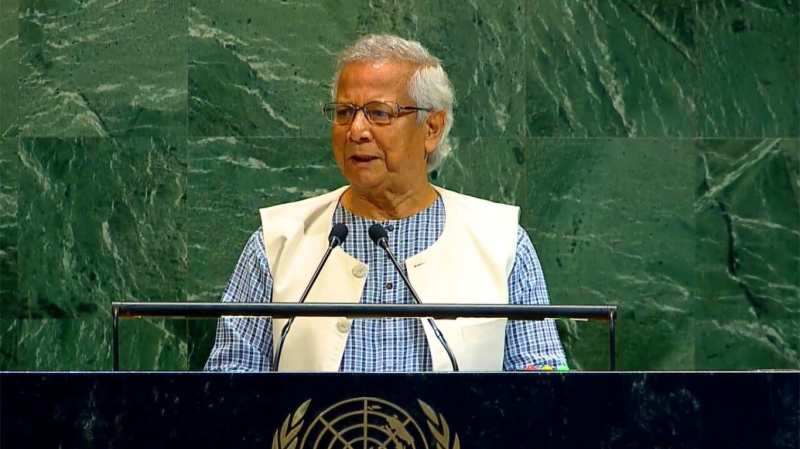- Toxic Waste Chokes Dhaka’s Four Major Rivers |
- NRB Remittance Rescued Economy After July Crisis: CA |
- 36 Killed, Dozens Injured in Tamil Nadu Rally Stampede |
- 36pc of Job Seekers Rely on Friends and Family Networks |
- Govt to Announce New Hajj Packages Sunday, Costs to Drop |
Prof Yunus Calls for People-Centered Democracy in Bangladesh

Chief Adviser Professor Muhammad Yunus today addressed the 80th Session of the UN General Assembly in the USA.
Chief Adviser Prof Muhammad Yunus on Friday urged the international community to support Bangladesh’s vision of a balanced democratic order, where no elected leader can undermine democracy or prey upon the people.
“Our goal is clear: to create a democratic system where power is balanced, no autocrat can return, no elected leader can destroy democracy, and those tasked with protecting the people can never exploit them,” he said.
Prof Yunus made the remarks while addressing the 80th United Nations General Assembly, in the presence of global leaders and key Bangladeshi political representatives.
As the country prepares for national elections in February, he said reforms remain focused on citizens. “Our priorities are transparency, accountability, and the rule of law,” Prof Yunus noted.
To implement this vision, Bangladesh has established eleven independent commissions covering governance, judiciary, elections, public administration, law enforcement, anti-corruption, women’s rights, and other vital areas. These commissions consulted citizens, conducted in-depth studies, and proposed detailed reforms.
To ensure the reforms endure, a National Consensus Commission brought together over thirty political parties and coalitions. Prof Yunus highlighted the historic “July Declaration,” a time-bound commitment to reform announced on the first anniversary of the July Uprising.
“This commitment ensures that no matter who wins the next election, reforms will continue and never be reversed,” he said.
Recalling Bangladesh’s journey, Prof Yunus said the country was born in 1971 through a struggle for equality, dignity, and social justice. Over the past five decades, citizens, particularly youth, have repeatedly reclaimed their rights. “It was our youth who stood up during the July Uprising, defeated tyranny, and opened the path toward a just and equal society,” he said.
Prof Yunus emphasized that rebuilding Bangladesh’s economy and state required deep institutional reforms. “We could have imposed reforms by executive order, but we chose the hard path: reforms built through inclusion and sustained through consensus,” he said.
He congratulated Annalena Baerbock on becoming the fifth woman to preside over the UN General Assembly and praised the UN’s eight decades of advancing peace, security, human rights, and development. “Because of the UN, over 130 million vulnerable people in 120 countries receive urgent humanitarian aid, and nearly 45 percent of the world’s children are immunized,” he noted.
At the same time, Prof Yunus acknowledged the UN’s limitations in resolving state conflicts and confronting global challenges, while affirming that its overall contribution has been overwhelmingly positive.
The Bangladeshi delegation accompanying Prof Yunus included political leaders from BNP, Jamaat-e-Islami, NCP, and senior government advisers, reflecting a broad representation of the country’s leadership at the UNGA.

